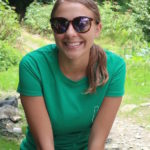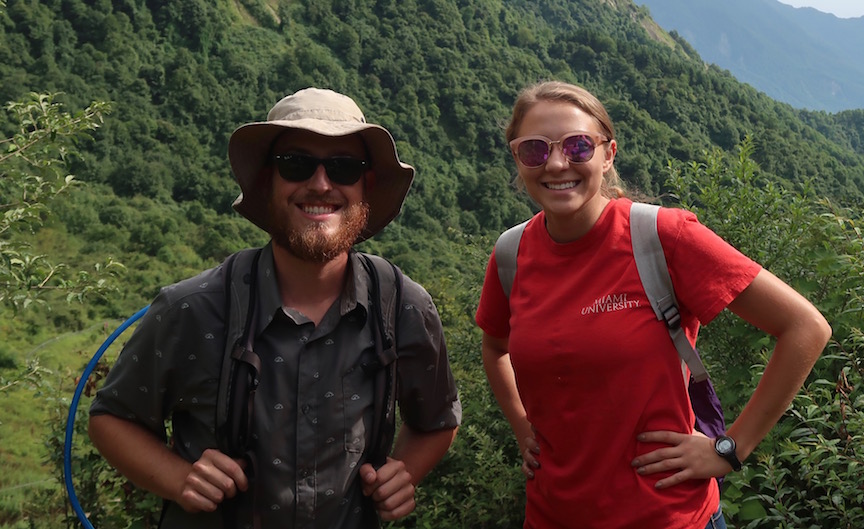My adventure began with a 13 hour nonstop flight from Chicago O’Hare Airport to Beijing. I claimed my bag, went through customs and hurried to catch my flight to Chengdu only to find there was a delay. After 8 hours of waiting and trying to sleep on the airport floor we finally boarded the airplane. I was so happy and relieved to see Nate waiting for me as I deplaned. Next, we had a two hour car ride to Gengda, my new home for the next 3 months. Luckily we had a driver pick us up instead of having to ride the bus. I quickly realized we were not in the states any more as it is the norm to honk at people and speed by and pass them. I tried not watching as our driver went into the left lane around curves when we were in tunnels to pass cars. In spite of everything I arrived safely in Gengda. Apparently there was a large earthquake one of our first nights here, but I slept through it because I was exhausted.
Our housing here is wonderful with the exception of the dreaded squatter toilet. I imagine I’ll get used to it. The next day we went straight to work setting up cameras in the reintroduction pens. It is an exciting and treacherous hike to get to the pens, as Nate mentioned in his latest blog post. Some of the hazards we had to watch out for on the hike were electric shocks, leeches, getting cut or impaled on bamboo, falling off cliffs, and of course pandas heading our way. On our hiking days, I discovered a large part of Chinese life style is waking late and afternoon naps. So, we spent a large portion of the day waiting for the keepers to take us to the next pens. I think I could get used to sleeping late and napping though.
After surviving the camera set up, we had to focus on perfecting the study protocol since the reintroduction study is new. I am fortunate to be at the ground level of this research and observe how to create the protocol for a study. This investigation will be ongoing long after I leave. I will be excited to observe the data being accumulated and the ultimate results. After hashing things out like which behaviors should be scored and where to place the cameras we would return to our housing.
In the evenings we head off to a family style dinner in town. We rely on Meghan to order our food every night, so it will be interesting to see what we eat when she is gone. She would try to order her favorite dishes for us but we would either get variations or totally different dishes. It’s hard to get used to the different style of food here. I’m already craving hamburgers and pasta. On the bright side, I have been lucky enough to not have any stomach bugs from the new bacteria in China.
Even though dangers exist with field work, we have great mentors, Meghan and Nate, to reassure us that a cut on our arm is not flesh-eating bacteria. Also, even though we are a thousand miles away from home, the Chinese people truly welcome us in and will go out of their way to help us even when we cannot communicate with them. That’s all for now, I will update you all with our next adventures!
___________________________________________________________
 Hello! I’m Nicki Gordon and I will be in Gengda, Sichuan, China working as a PDXWildlife giant panda reintroduction intern until October. If you have any questions or would like to know more about the research that PDXWildlife is doing, be sure to leave a comment below.
Hello! I’m Nicki Gordon and I will be in Gengda, Sichuan, China working as a PDXWildlife giant panda reintroduction intern until October. If you have any questions or would like to know more about the research that PDXWildlife is doing, be sure to leave a comment below.


Love your post! Maybe we’ll get to meet you when our group goes to Gengda. Hoping to connect with Nate while we’re there, at any rate. Anyway, keep up the good work! It must be so exciting to work on the reintroduction project.
Thank you! I would love to meet you when you come to Gengda. You will have to let us know!
Welcome, Nicki! Sounds like getting there was quite a challenge! Can’t wait to hear about your re-introduction studies – I have mixed emotions about it – the jury is still out for me but your research will enable the pandas chosen for this project to not just be “dumped” back into the wild in “sink or swim” style! Best of luck and have fun! Let us hear from you again soon!
Sincerely, JoAnn Mann
Yes, hopefully this research will help determine which pandas will be best suited to be reintroduced into the wild. I will update soon with more information! Thanks for the welcome!